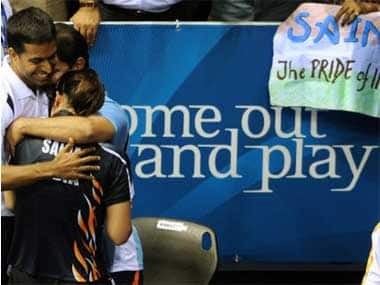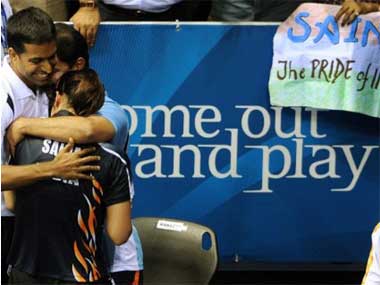Most of us can relive the moments after the ICC Cricket World Cup finals when the unassuming coach of team India Gary Kirsten was hoisted on the shoulders of young cricketers during the victory lap. The coach was integral to the team and its performance and he was being given due recognition. A coach-student relationship is as sacred as a blood relation, maybe more. The coach shapes the lives and character of their students. The coach infuses the champion with dreams, sculpts the champion with dedication to fulfil those dreams, and selflessly readies the player to compete to the best possible extent. The coach and ward are a team, a single unit. They work in tandem and they have a common goal. They share the intensity of training sessions, the pressure of tournaments, the frustration of failures and injuries, the pre-match preparations and the post match analysis and all the time in between. In short, they share their lives with each other. Someone commented the other day that the ward is the alter ego of a coach and I couldn’t agree more. The coach and player have to be attuned to one another — habits, temperament, beliefs et al. The relationship must feel secure and natural — hand in a glove. This is what I call the growing up phase, at this juncture respect for the coach’s ideas and judgment are still intact. [caption id=“attachment_15220” align=“alignleft” width=“380” caption=“Not all’s well between coach P Gopi Chand and Saina Nehwal. Indranil Mukherjee/AFP”]
 [/caption]The danger arises when a player feels that he/she has garnered enough experience to fight battles alone. A few wins and the player feels fully equipped to conquer the world. He/she feels they have found their own wings. Until now, the coach was the wind beneath those wings but now the confidence and strength are deemed enough to carry one through. Once such instance is the recent tiff between Indian badminton star Saina Nehwal and her coach P Gopi Chand. As in other facets of life, the rebel phase begins – or what I call the teenage years. A player strives for independent decision making, ideals and ideas. There is no need to be watched over anymore. The inputs and explanations are all rote by now. What more could there be? One feels there is nothing more to learn – one knows it all. At this time the player feels in control of his fate. Cracks begin to emerge in the relationship. The trust, judgment and integrity get questioned on both sides. Those cracks sometimes turn to crevices even. The relationship has probably run its course. It is time to let go. Let the player soar or fall on their own wings. However, this need not always be a negative phase. One may move on to learn and discover new techniques and tactics. Andre Agassi’s move from the Nick Bollettieri Academy in Florida to train with Brad Gilbert worked out well for him and he went on to win the US Open in 1994. But on the flip side, the rhythm of the career could be hampered especially if its been a winning combination thus far and especially if the split is premature. After years of working so closely, the balance can be disrupted. The point of concern is not really the split occurring but more so about how and why it did. If it had to do with ego and arrogance on the part of either party or a mere misunderstanding, then that’s a shame. If both parties are spewing venom at each other then that’s even worse. Kobe Bryant, the Lakers star was conceited and rubbed his coach Phil Jackson the wrong way. However, there have been many instances where the separation is handled amicably and decently. My coach of eight years, Anil Pradhan advised me to go to train under the legendary Prakash Padukone as he felt that my career was at a point where I needed more professional guidance. All this apart, most importantly, through all this, the performance of the player should not suffer and neither should the zeal of the coach to create yet one more champion. In the era of intense competition, we cannot afford a slump in either individual’s performance. Players are known to be mentally strong but this unique relationship with the coach runs really deep and can get very emotional. It’s big. It can affect the psyche and confidence. No wonder Pete Sampras was unable to fight back tears at the Australian Open in 1996 knowing that his long time coach Tim Gullikson was suffering from brain cancer. Today in the time of instant foods and services, the coach is expected to churn out magic formulae regularly and ensure splendid performances on a regular basis. If not, it is time for a change, obviously. The players change coaches without batting an eyelid, some for the most trivial reasons and others to keep up with the cut throat competition of the sporting world. That’s a trait of the times we living in. The players and coaches might take separate routes, sometimes for better and sometimes for worse. And yet, the show must go on.
[/caption]The danger arises when a player feels that he/she has garnered enough experience to fight battles alone. A few wins and the player feels fully equipped to conquer the world. He/she feels they have found their own wings. Until now, the coach was the wind beneath those wings but now the confidence and strength are deemed enough to carry one through. Once such instance is the recent tiff between Indian badminton star Saina Nehwal and her coach P Gopi Chand. As in other facets of life, the rebel phase begins – or what I call the teenage years. A player strives for independent decision making, ideals and ideas. There is no need to be watched over anymore. The inputs and explanations are all rote by now. What more could there be? One feels there is nothing more to learn – one knows it all. At this time the player feels in control of his fate. Cracks begin to emerge in the relationship. The trust, judgment and integrity get questioned on both sides. Those cracks sometimes turn to crevices even. The relationship has probably run its course. It is time to let go. Let the player soar or fall on their own wings. However, this need not always be a negative phase. One may move on to learn and discover new techniques and tactics. Andre Agassi’s move from the Nick Bollettieri Academy in Florida to train with Brad Gilbert worked out well for him and he went on to win the US Open in 1994. But on the flip side, the rhythm of the career could be hampered especially if its been a winning combination thus far and especially if the split is premature. After years of working so closely, the balance can be disrupted. The point of concern is not really the split occurring but more so about how and why it did. If it had to do with ego and arrogance on the part of either party or a mere misunderstanding, then that’s a shame. If both parties are spewing venom at each other then that’s even worse. Kobe Bryant, the Lakers star was conceited and rubbed his coach Phil Jackson the wrong way. However, there have been many instances where the separation is handled amicably and decently. My coach of eight years, Anil Pradhan advised me to go to train under the legendary Prakash Padukone as he felt that my career was at a point where I needed more professional guidance. All this apart, most importantly, through all this, the performance of the player should not suffer and neither should the zeal of the coach to create yet one more champion. In the era of intense competition, we cannot afford a slump in either individual’s performance. Players are known to be mentally strong but this unique relationship with the coach runs really deep and can get very emotional. It’s big. It can affect the psyche and confidence. No wonder Pete Sampras was unable to fight back tears at the Australian Open in 1996 knowing that his long time coach Tim Gullikson was suffering from brain cancer. Today in the time of instant foods and services, the coach is expected to churn out magic formulae regularly and ensure splendid performances on a regular basis. If not, it is time for a change, obviously. The players change coaches without batting an eyelid, some for the most trivial reasons and others to keep up with the cut throat competition of the sporting world. That’s a trait of the times we living in. The players and coaches might take separate routes, sometimes for better and sometimes for worse. And yet, the show must go on.
Arjuna awardee Aparna Popat is a former world number 16. She was India’s national badminton champion for nine consecutive years from 1998 – 2006 and shares the record for most national titles won with the legendary Prakash Padukone. She also participated in the Sydney and Athens Olympics.
)